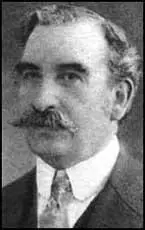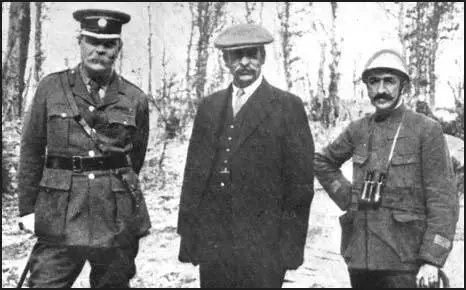Robert Donald

Robert Donald, the son of a stone mason,was born in Corsemaul, Banffshire, on 29th August, 1860. Donald became a newspaper reporter in Edinburgh before moving to London in 1893 where he founded the Municipal Journal. He left this periodical in 1902 and took up the post as editor of the Daily Chronicle. He successfully increased the circulation and influence of this Liberal newspaper.
In 1914 Donald was able to claim that the net sale of the Daily Chronicle exceeded the combined sales of the The Times, Daily Telegraph, Morning Post, Evening Standard and the Daily Graphic.
United Newspapers Limited, the company that owned the Daily Chronicle, was impressed with Donald's achievements. In 1914 it was decided to make Donald the Managing Director of the company. Donald now had overall responsibility for the company's Lloyd's Weekly News as well as the Daily Chronicle.
The Daily Chronicle supported the progressive wing of the Liberal Party. After visiting the Western Front and meeting Sir William Robertson, chief of the Imperial Staff (the liaison between the British Army and the government), Donald decided that Herbert Asquith should be replaced by David Lloyd George. Articles by Donald helped to undermine Asquith and played a part in his resignation.
As soon as David Lloyd George became prime minister in December 1916, he invited Donald to join the secret War Propaganda Bureau. Donald was asked to write a report on the effectiveness of the organisation. As a result of Donald's recommendations, the government established a Department of Information. John Buchan was put in charge on the department on an annual salary of £1,000 a year. Charles Masterman was given responsibility for books, pamphlets, photographs and war paintings and T. L. Gilmour dealt with cables, wireless, newspapers, magazines and the cinema.

The following year David Lloyd George set up a Ministry of Information. Lord Beaverbrook was put in overall charge of the organisation and other appointments included Donald (Director of Propaganda in Neutral Countries) and Lord Northcliffe (Director of Propaganda in Enemy Countries). On the announcement in February 1918, Lloyd George was accused in the House of Commons of using this new system of getting control over all the leading figures in Fleet Street.
After two months working at the Ministry of Information, Donald resigned. At the time he claimed it was due to pressure of work but unpublished documents suggest that Donald believed the work was compromising his independence as an newspaper editor.
On 9th April, 1918, the prime minister, David Lloyd George, told the House of Commons that despite heavy casualties in 1917, the British Army in France was considerably stronger than it had been on January 1917. He also gave details of the numbers of British troops in Mesopotamia, Egypt and Palestine.
Sir Frederick Maurice, whose job it was to keep accurate statistics of British military strength, knew that David Lloyd George had been guilty of misleading Parliament about the number of men in the British Army. Maurice wrote to Sir Henry Wilson, the Chief of the Imperial General Staff, pointing out these inaccuracies. He did not receive a reply and after consulting with friends and relatives, he took the decision to write a letter to the newspapers giving the true figures.
On 7th May, 1918, the principal newspapers published Maurice's letter accusing David Lloyd George of giving the House of Commons inaccurate information. Maurice, by writing the letter, had committed a grave breach of discipline. He was retired from the British Army and was refused a court martial or inquiry where he would have been able to show that David Lloyd George had mislead the House of Commons on both the 9th April and 7th May, 1918.
Donald took the decision to appoint Sir Frederick Maurice as the military correspondent of the Daily Chronicle. Lloyd George was furious with Donald's decision to employ Maurice and on 5th October it was announced that a group of his friends led by Sir Henry Dalziel, had purchased the Daily Chronicle. Donald resigned in protest and complained that Lloyd George was trying to "corner public opinion".
After the war Donald wrote several books including A Danger Spot in Europe (1925), The Tragedy of Trianon (1928) and The Polish Corridor and its Consequences (1929). Donald also undertook publicity work for his old friend, Ramsay MacDonald.
Robert Donald died on 17th February, 1933.
Primary Sources
(1) Robert Donald, Daily Chronicle (August, 1915)
The soil is soft clay, admirably suited for entrenching, tunnelling, and mine warfare - when it is dry. As an outside observer, I do not see why the war in this area should not go on for a hundred years, without any decisive result. What is happening now is precisely what happened last year. The only difference is that the trenches are deeper, dug-outs better made, tunnels are longer, and the charges of explosives heavier.
Everywhere there are trenches, barbed wire, machine guns where they are least expected, and all the complicated arrangements for defence. The trenches are very deep, very narrow, and very wet. Streams of water run at the bottom.
The nearer one gets to the front the more mysterious and wonderful become the methods of defence. You are allowed to peer through an observation post towards the German trenches a few hundred yards away. You see absolutely nothing but a mass of brushwood, broken trunks of trees, hanging branches and barbed wire.
The guns were always at work. On my day of my visit to this area there was an almost continuous bombardment going on. The shells were hurtling over our heads. You heard the sharp discharge, and then the exploding of the shell. You saw nothing. The sound re-echoes through the woods and valleys like rolling thunder. The French fire six rounds to the enemy's one. The object of the cannonading is to disturb any work going on behind the enemy lines.
(2) Robert Donald, diary entry (24th November, 1916)
Sir William Robertson lunched with me. He was quite against the Eastern effort, as he has always been, and now he considered that it had become quite impossible owing to the difficulty of transport. He thought that the effect of dragging in the Balkans was only to prolong the war and weaken our forces in the West. The only two Eastern countries which could have given us effective help were Bulgaria and Turkey, and we had them against us. He was equally opposed to our tactics in Greece.
He complained that there was far too much delay and no possibility of getting decisions out of the War Council. It was far too big and there was too much discussion. Something had to be done, in order to get a move on. He liked Mr. Asquith, but he was indecisive. Sir William said that the only man who could decide quickly, say "Yes" or "No" without hesitation, was Lloyd George. He might say the wrong "Yes" or the wrong "No" sometimes, but he much preferred that to no decision at all. He was in favour of some arrangement which gave Mr. Lloyd George greater power. He did not mean greater power to interfere with military operations, but greater power in the direction of war policy.
(3) Robert Donald, editorial in the Daily Chronicle (29th November, 1916)
We were not originally favourable to the formation of a Coalition Ministry, but ever since it was formed we have supported it because in its very nature it can hardly be replaced during the war without national dissension and grave international peril.
The Ministry's arch-defect is inability to make up its mind. It is not so much that it reaches wrong decisions, as that for weeks and even months, it fails in crucial matter after crucial matter, to reach any decision at all.
(4) Robert Donald, diary entry (7th December, 1916)
I called on Mr. Asquith at 10 Downing Street, at 4 o'clock. He was sitting at the large table in the Cabinet room, his back to the fire. He looked a very lonely figure and a tired man. Lying in front of him were a few letters, just received from a political friends. He had a quiet and severe expression.
He said that Mr. Lloyd George had always professed to be the most friendly with him and no rift had occurred in their personal relations. He had the greatest admiration for him. Lloyd George possessed unique gifts, a real flare for politics, foresight, inspiration, etc. He would not say that Lloyd George owed everything to him, but he certainly owed a great deal. He saved him during the Budget of 1909, when all the Cabinet turned against him, and he came to his rescue and risked his own fate with Lloyd George's.
(5) Robert Donald, press release (February, 1918)
I have been asked to become the Director of of a section of propaganda work. I could not undertake work of this kind if it interfered with my editorial responsibilities or my political independence, or if it did not give me liberty of action within the sphere allotted to me. After all, this is a newspaper man's job. It consists simply of presenting the British case in neutral and allied countries in a form which is at once interesting and informative.
(6) Frederick Maurice, The Daily Chronicle (3rd October, 1918)
The British successes on the Western Front since 8th August are much the greatest in scale ever won by the British Army or a British General. Within the period under review General Pershing and General Allenby have received the official congratulations of the British Government, and Mr. Lloyd George has congratulated Marshal Foch. Various private organizations have sent congratulations to Sir Douglas Haig, including the Labour Party and the National Liberal Federation; but the War Cabinet has remained silent.
(7) Robert Donald recorded in his diary a meeting with Frank Lloyd, the owner of the Daily Chronicle (4th October, 1918)
I saw Mr. Lloyd just a little before lunch. He said that Mr. Lloyd George complained of the criticisms which had appeared in the Daily Chronicle, and said, "We cannot trust Donald". I said that we had always supported the Government on the main issues of the war, and that he had made no complaint about the attitude of the paper.
(8) The Morning Post (17th October, 1918)
It is at least a coincidence that the Daily Chronicle should have thus changed hands at a moment when that journal was developing into an outspoken critic of Lloyd-Georgian policies. Just as there are other ways of killing a cat than choking it with cream, so there are other ways of silencing newspaper critics than by conferring on them the Order of the British Empire.
(9) The Star (17th October, 1918)
One thing we may be certain of there will be no repetition of the leading article which complained that Sir Douglas Haig had never received the congratulations of the Prime Minister and the War Cabinet on his brilliant series of victories. The article appeared in the Daily Chronicle on Thursday morning. On Friday night the Prime Minister's representative had taken charge of the offices of the newspaper and Mr. Donald had resigned. Fleet Street knows the Prime Minister does not spare those who cross his path. General Maurice, who ceased to be a Director of Military Operations when he exposed the Prime Minister's speeches, is now the Military Correspondent of the Daily Chronicle, and it will be interesting to see how long he holds that post.
(10) Walter Runciman, letter to Robert Donald (October, 1918)
The journalistic upheaval of the last fortnight has been on my mind, and I feel that it is a matter for pride to your friends to have seen the dignified and emphatic manner of your departure from the Daily Chronicle. The whole transaction bears the mark of the hands which devised the scheme of political influence from which political opinion has suffered during the last two years.
